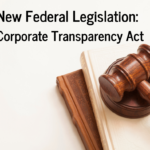The Paycheck Protection Program Flexibility Act of 2020 (HR 7010) (the “New Act) was signed and made law by the President after an almost unanimous approval by the House and passage through Senate this week. The New Act provides useful updates for small business borrowers under the CARES Act’s Paycheck Protection Program (“PPP”), including increased leeway in how funds are spent and more lenient forgiveness terms.
Changes under the New Act include:
Covered Period
- Under the PPP, borrowers were given an eight-week window to spend loan funds on eligible costs to qualify for forgiveness.
- Under the New Act, borrowers may elect to extend their covered period to the earlier of 24 weeks or December 31, 2020.
Eligible Costs Allocation
- Eligibility for forgiveness under the PPP’s original terms required borrowers to spend no less than 75% of loan funds on payroll-related costs.
- The New Act reduces this requisite threshold down to a minimum of 60%. This reduction creates a “cliff” and borrowers that do not meet the 60% requirement will not be eligible for any forgiveness of their PPP funds.
Repayment Extension
- The New Act allows borrowers to repay any remaining loan balance not forgiven over five years with a 1% interest rate.
- Borrowers originally had a two-year repayment term under the PPP before these changes.
Social Security Payroll Tax Deferral
- The New Act allows borrowers to defer payment of the employer’s share of Social Security payroll taxes regardless of loan forgiveness.
Restoring Historic Employment Levels and Forgiveness Changes
- Under the New Act, borrowers now have until December 31, 2020, to restore their workforce numbers to pre-COVID-19 levels or complete one of the following:
- Provide documentation demonstrating a worker has refused an employment offer,
- Provide documentation demonstrating an inability to locate qualified employees for available positions, or
- Provide documentation demonstrating an inability for their business to return to previous operating activity due to compliance with governmental orders or social distancing requirements.
Please contact your KDDK attorney or any member of the KDDK business law team for additional information and individualized guidance on the CARES Act or any related matter.




